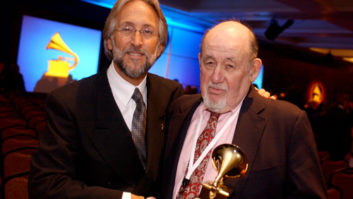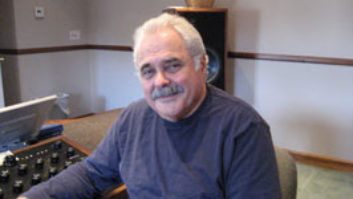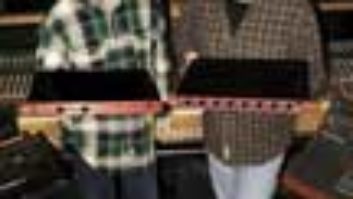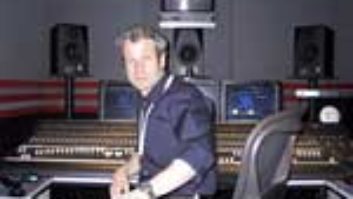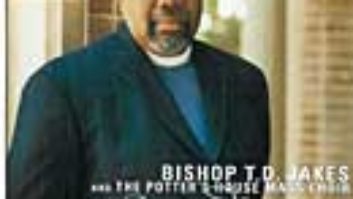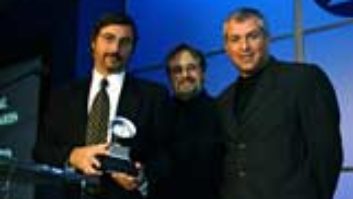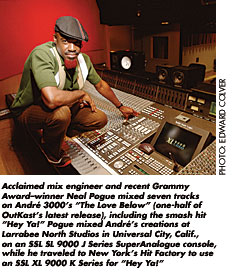
The 46th Annual Grammy Awards
Apr 1, 2004 12:00 PM,
By Blair Jackson
Is it just me, or does it seem as though every year, fewer trophies are handed out during the Grammy® Awards telecast? Believe it or not, I sort of miss seeing the speeches. Of course, the “up” side of the paucity of actual awards is that the program is now nearly wall-to-wall performances and they are reliably good.
Is there anyone who wasn’t knocked out by the Prince-Beyoncé pairing that opened this year’s show? Talk about a dynamic duo — now that would be a great tour! And how about the Black Eyed Peas? Big fun with a cool message. We salute the show’s producers for a number of interesting pairings: Sting with the charismatic, if incomprehensible, rapper Sean Paul; the Foo Fighters with Chick Corea; and Justin Timberlake and Arturo Sandoval. We offer our condolences to Alicia Keys and Celine Dion, who were vexed by rare, but inexcusable, technical gremlins during their performances. And controversial or not, we dug OutKast’s Native American — themed production number on “Hey Ya!” Finally, shame on the U.S. government for its misguided and cowardly decision not to let Cuban musicians such as Ibrahim Ferrer and Manuel Galbán attend the Grammys. Both won!
The actual awards didn’t provide many surprises, save for Evanescence’s victory in the Best New Artist category. Beyoncé, as expected, was the big winner of the night, taking home five awards — better get used to her, because you’re going to be seeing her up there for years to come. OutKast also scored big, but there was plenty of glory to go around for everyone from the White Stripes to Metallica, Wayne Shorter to the Blind Boys of Alabama, Weird Al Yankovic to Luther Vandross, George Harrison to Pink. With a whopping 105 categories, there was no shortage of trophy recipients. For a complete list of the winners and lots more photos from the show, go to www.grammy.com.
However, each year, we at Mix like to single out and salute the engineers and producers who triumphed at the Grammys, and we had a chance to chat with a couple of ’em.
Record of the Year — Coldplay: “Clocks”; Coldplay and Ken Nelson, producers; Coldplay, Nelson and Mark Phythian, engineers/mixers.
Such are the vagaries of Grammy eligibility that Coldplay’s A Rush of Blood to the Head album earned Grammys for the group both last year and this year. “Clocks” was ubiquitous in 2003, and its victory was only a mild surprise in what was, as always, a very strong category.
Album of the Year — OutKast:Speakerboxxx/The Love Below; André “3000” Benjamin, Carl Mo and Antwan “Big Boi” Patton, producers; Vincent Alexander, Chris Carmouche, Terrence Cash, Kevin “KD” Davis, Reggie Dozier, John Frye, Robert Hannon, Padraic Kernin, Moka Nagatani, Pete Novak, Brian Paturalski, Neal Pogue, Dexter Simmons, Matt Still and Darrell Thorp, engineers/mixers; Brian Gardner and Bernie Grundman, mastering engineers.
Propelled by the infectious smash single “Hey Ya!” this album — featuring one disc by André 3000 and another by Big Boi — continues to sell like hotcakes. It was recorded mostly in Atlanta at the duo’s Stankonia Studios (see Mix, December 2003 for details), but also mixed in Los Angeles and New York. After the Grammys, we spoke with longtime OutKast associate Neal Pogue, who mixed seven songs on the André disc, including “Hey Ya!” and current single “Roses,” and came away from the Staples Center with his first Grammy (after four nominations). Currently working with Boyz II Men on an album of ’70s and ’80s soul classics, as well as new artist Bobby V., Pogue says he knew “Hey Ya!” was a hit “right outta the box! When I first heard that song, Dre and I were riding around in L.A. in his car. He put on that song, which at that point just had one verse and the chorus, and I was like, ‘That’s it! That’s the single! You’ve gotta finish that song!’ He was saying, ‘Really, you think so?’ ‘Yeah, man — this is the one; this is gonna knock everyone out.’ Well, it took him months to finish the second verse and the rest of the song — the breakdowns and all that — but eventually he did, of course, and it blew up; it’s history now.” Pogue and André mixed the single at The Hit Factory in New York on an SSL 9000 K; the other six tunes that Pogue mixed were done at Larrabee North in L.A. on an SSL 9000 J.
“André pretty much knows how he wants his songs to sound,” Pogue comments, “but when he and I get together, he pretty much lets me do my thing to add to and enhance his vision. So it’s a joint venture when it comes to mixing. We’re both nitpickers who spend a lot of time making sure a record has the right sound. Is everything sitting in the right place, not too loud or too low? Levels mean everything to me. I’m not into having everything be right in your face. I want people to be listening a year later and say, ‘Wow, I never heard that instrument before.’”
Best Engineered Album, Non-Classical — Radiohead: Hail to the Thief. Nigel Godrich and Darrell Thorp, engineers.
Widely hailed for its sonic inventiveness, Radiohead’s latest continued their assault on rock conventions with a deft mixture of rock and moody atmospherics. Why has this British band clicked more with American audiences than Oasis, Blur and so many other imports? Bandleader Thom Yorke certainly has a singular vision, but so does the band as a whole, thanks in part to Nigel Godrich’s broad palette. You’ll note that Darrell Thorp also worked on the OutKast album.
Producer of the Year, Non-Classical — The Neptunes (Pharrell Williams and Chad Hugo).
2003 was definitely the Year of The Neptunes, and it was a pleasant surprise to see them recognized for their contributions. Among the songs and albums they toiled over were “Beautiful” (Snoop Dogg, featuring Pharrell and Uncle Charlie Wilson); “Come Close” (Common, featuring Mary J. Blige); “Excuse Me Miss” (Jay-Z); “Frontin’” (The Neptunes, featuring Pharrell Williams & Jay-Z); songs from Justin Timberlake’s smash album Justified, including “Rock Your Body”; “Luv U Better” (LL Cool J, featuring Marc Dorsey); and The Neptunes Present…Clones (The Neptunes, featuring various artists).
Best Remixed Recording — Maurice Joshua: “Crazy in Love (Maurice’s Soul Mix) by Beyoncé featuring Jay-Z. After many years of remixing for some of the biggest names in R&B (Destiny’s Child, Puff Daddy, Mariah Carey, En Vogue), Joshua earns his first Grammy, after four nominations.
Producer of the Year, Classical — Steven Epstein, for Obrigado Brazil (Yo-Yo Ma and others); Mendelssohn/Bruch: Violin Concertos (Midori); Paris la Belle Époque (Yo-Yo Ma & Kathryn Stott)
Best Engineered Album, Classical — Obrigado Brazil by Yo-Yo Ma and others. Engineered by Richard King and Todd Whitelock.Winning a Grammy is not new to Classical Producer of the Year Steven Epstein, who has won this category five times since 1984, and also won Grammys for various individual productions. The New York — based Epstein was actually teaching a graduate “Classical Record Production” class at McGill University in Montreal when a former student relayed the news that he had won the Grammy. “It never gets old,” he says with a laugh, “but frankly, I didn’t expect to win this year.”Epstein describes Obrigado Brazil as “a crossover album of sorts, because it has some elements of Brazilian pop music, but there’s also Villa Lobos on there; it’s very eclectic. It ranges from piano and cello chamber music all the way up to an ensemble that features double-percussion, jazz instrumentalists like Paquito Rivera, native Brazilian players and, of course, Yo-Yo Ma.”The album was mainly recorded by Epstein’s frequent partner Richard King at Right Track Studios, which Epstein calls, “The best-sounding big room in New York City. I’ve done a lot of recording there the last couple of years, from show music to jazz to classical to crossover. You get enough volume for the acoustic instruments to speak very nicely without it being overly reverberant. Todd Whitelock also did a great job on the pieces for piano and cello that are on there. Those were done at Clinton Studios, which is smaller than Right Track — also a really nice-sounding room. The post-production was done at Sony Music.”Best Classical Album — Mahler: Symphony No. 3; Kindertotenlieder. Michael Tilson Thomas, conductor, San Francisco Symphony. Producer: Andreas Neubronner. Engineers: Dawn Frank, Peter Laenger and Neubronner.The latest, and some say one of the greatest, interpretations of Mahler’s challenging, nearly two-hour symphony is one of the cornerstones of the Romantic era.
<<<<<<<<<<<<<<<<<< PAGE BREAK >>>>>>>>>>>>>>>>>>
